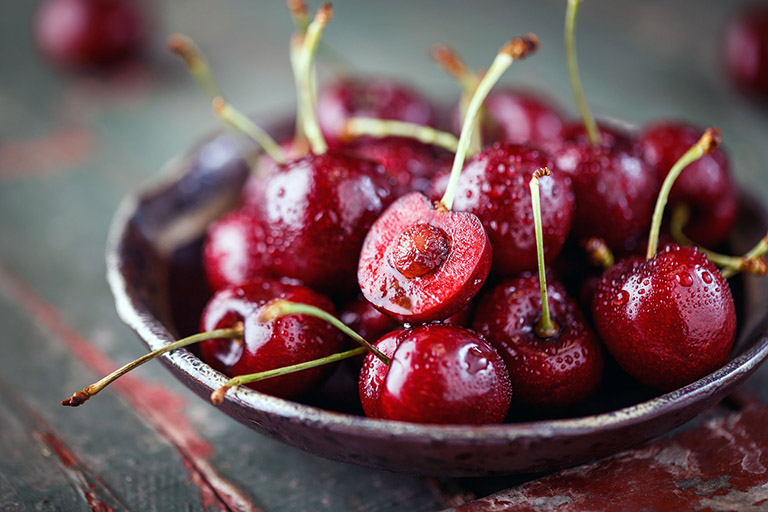That is the cherry fruit, also known as the cherry. Each fruit has only 1 seed in the middle, with a beautiful red outer shell. Each cherry fruit has a diameter of about 2.5cm, usually slightly sour and sweet, shiny skin, attractive fragrance, juicy and crunchy flesh. This type of fruit is often eaten directly like other fruits or used in fruit salads.
Experts say that in 154g of cherry meat, there is 5% DV manganese, 97 calories, 10% DV potassium, 2g protein, 5% DV copper, 25g carbs, 3g fiber,18% DV vitamin C.
With such high nutritional content, cherry brings many benefits for human health.

Preventing diabetes
The taste of ripe cherries is very fragrant and sweet, but this is a fruit that effectively controls sugar levels. The glycemic index of cherry is ranked low, around 22-32. So when eating cherry, your blood sugar and insulin levels will not spike.
Cherry also contains anthocyanins – antioxidants that bring many health benefits, helping to reduce the risk of type 2 diabetes. It also inhibits enzymes that cause type 2 diabetes.
Statistics on women with diabetes show that those who consume cherry juice and sour cherries daily for 6 weeks have reduced weight, lower blood pressure and decreased blood sugar.
During the treatment of diabetes, cherries are very supportive. Cherries not only help regulate blood sugar, but also help reduce risk factors such as obesity, overweight or high blood pressure. Although cherry does not prevent diabetes, it can participate in preventing the disease and reducing symptoms in the long term.

Protecting cardiovascular health
The nutrients in cherries such as potassium or polyphenols are good for heart health, help regulate blood sugar and reduce cholesterol. In addition, they have the ability to reduce the risk of cardiovascular diseases in the future.
Regularly consuming cherries helps control the body’s sugar absorption, lowers blood pressure and prevents inflammation. Studies show that cherries also help reduce cholesterol levels in the body, for every 1% decrease in cholesterol, you reduce the risk of heart disease by 2%.
Providing energy
This fruit provides energy naturally. The calories in cherries come from natural sugars that help boost mood and increase energy in your body. If you feel tired, eat a few fresh cherries, you will feel more energized.
Drinking cherry juice also helps limit muscle damage during and after exercise. A study conducted on marathon runners who drank cherry juice a few days before the race showed that the athletes quickly recovered after training. In addition, these athletes were less prone to muscle cramps and soreness while running. So this is a great drink after a workout to soothe muscle damage and quickly replenish energy.

Preventing cancer
Cherries contain anthocyanin, an antioxidant that helps minimize oxidative damage that can cause cancer. Studies show that some types of cancer are inhibited by the anthocyanin in this fruit.
In addition, vitamin C in cherries can also reduce the risk of lung cancer in smokers. This is also a good source of cyanidin that promotes cell differentiation and reduces the risk of healthy cells turning into cancer cells.
Therefore, supplementing cherries into your daily diet is a great way to reduce the risk of developing certain types of cancer in your body.














